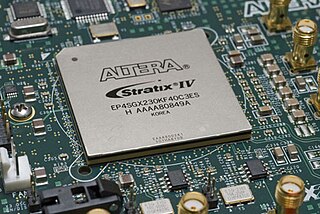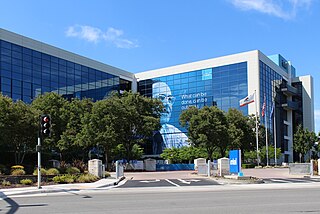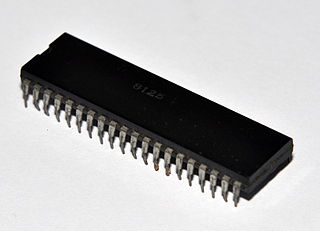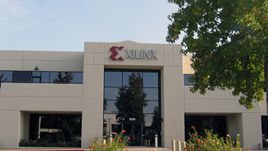
Advanced Micro Devices, Inc. (AMD) is an American multinational corporation and semiconductor company based in Santa Clara, California, that develops computer processors and related technologies for business and consumer markets.

A field-programmable gate array (FPGA) is a type of configurable integrated circuit that can be programmed or reprogrammed after manufacturing. FPGAs are part of a broader set of logic devices referred to as programmable logic devices (PLDs). They consist of an array of programmable logic blocks and interconnects that can be configured to perform various digital functions. FPGAs are commonly used in applications where flexibility, speed, and parallel processing capabilities are required, such as in telecommunications, automotive, aerospace, and industrial sectors.

Intel Corporation is an American multinational corporation and technology company headquartered in Santa Clara, California, and incorporated in Delaware. Intel is one of the world's largest semiconductor chip manufacturers by revenue and ranked in the Fortune 500 list of the largest United States corporations by revenue for nearly a decade, from 2007 to 2016 fiscal years, until it was removed from the ranking in 2018. In 2020, it was reinstated and ranked 45th, being the 7th-largest technology company in the ranking.

An application-specific integrated circuit is an integrated circuit (IC) chip customized for a particular use, rather than intended for general-purpose use, such as a chip designed to run in a digital voice recorder or a high-efficiency video codec. Application-specific standard product chips are intermediate between ASICs and industry standard integrated circuits like the 7400 series or the 4000 series. ASIC chips are typically fabricated using metal–oxide–semiconductor (MOS) technology, as MOS integrated circuit chips.

Synopsys, Inc. is an American electronic design automation (EDA) company headquartered in Sunnyvale, California, that focuses on silicon design and verification, silicon intellectual property and software security and quality. Synopsys supplies tools and services to the semiconductor design and manufacturing industry. Products include tools for logic synthesis and physical design of integrated circuits, simulators for development, and debugging environments that assist in the design of the logic for chips and computer systems. As of 2023, the company is a component of both the Nasdaq-100 and S&P 500 indices.

Altera Corporation is a manufacturer of programmable logic devices (PLDs) headquartered in San Jose, California. It was founded in 1983 and acquired by Intel in 2015 before becoming independent once again in 2024 as a company focused primarily on Field-Programmable Gate Array (FPGA) technology and system on a chip FPGAs.

A gate array is an approach to the design and manufacture of application-specific integrated circuits (ASICs) using a prefabricated chip with components that are later interconnected into logic devices according to custom order by adding metal interconnect layers in the factory. It was popular during the upheaval in the semiconductor industry in the 1980s, and its usage declined by the end of the 1990s.

Xilinx, Inc. was an American technology and semiconductor company that primarily supplied programmable logic devices. The company is known for inventing the first commercially viable field-programmable gate array (FPGA). It also created the first fabless manufacturing model.
Lattice Semiconductor Corporation is an American semiconductor company specializing in the design and manufacturing of low power field-programmable gate arrays (FPGAs). Headquartered in the Silicon Forest area of Hillsboro, Oregon, the company also has operations in San Jose, Calif., Shanghai, Manila, Penang, and Singapore. Lattice Semiconductor has more than 1000 employees and an annual revenue of more than $660 million as of 2022. The company was founded in 1983 and went public in 1989. It is traded on the Nasdaq stock exchange under the symbol LSCC.
The transistor count is the number of transistors in an electronic device. It is the most common measure of integrated circuit complexity. The rate at which MOS transistor counts have increased generally follows Moore's law, which observes that transistor count doubles approximately every two years. However, being directly proportional to the area of a chip, transistor count does not represent how advanced the corresponding manufacturing technology is: a better indication of this is transistor density.
Microsemi Corporation was an Aliso Viejo, California-based provider of semiconductor and system solutions for aerospace & defense, communications, data center and industrial markets.
eSilicon is a semiconductor design and manufacturing services company that delivers custom ICs and IPs to OEMs.

LSI Logic Corporation, was an American company founded in Santa Clara, California, was a pioneer in the ASIC and EDA industries. It evolved over time to design and sell semiconductors and software that accelerated storage and networking in data centers, mobile networks and client computing.

Faysal A. Sohail is an American venture capitalist and Managing Director at Presidio Partners in San Francisco. Sohail was a co-founder of Silicon Architects and on the founding team of Actel Corporation, two influential companies in the computer chip industry. Sohail serves as the Chairman of the Advisory Board of InoBat Auto, a European electric vehicle battery producer. In addition to that, he holds the position of Chairman of the Board at Our Next Energy (ONE), and serves as a board member for both Ascend Elements, and Wildcat Discovery Technologies, focusing on the sustainable energy sector.

Tabula, Inc., was an American fabless semiconductor company based in Santa Clara, California. Founded in 2003 by Steve Teig, it raised $215 million in venture funding. The company designed and built three dimensional field programmable gate arrays and ranked third on the Wall Street Journal's annual "Next Big Thing" list in 2012.
Achronix Semiconductor Corporation is an American fabless semiconductor company based in Santa Clara, California with an additional R&D facility in Bangalore, India, and an additional sales office in Shenzhen, China. Achronix is a diversified fabless semiconductor company that sells FPGA products, embedded FPGA (eFPGA) products, system-level products and supporting design tools. Achronix was founded in 2004 in Ithaca, New York based on technology licensed from Cornell University. In 2006, Achronix moved its headquarters to Silicon Valley.
Hardware backdoors are backdoors in hardware, such as code inside hardware or firmware of computer chips. The backdoors may be directly implemented as hardware Trojans in the integrated circuit.

Adesto Technologies is an American corporation founded in 2006 and based in Santa Clara, California. The company provides application-specific semiconductors and embedded systems for the Internet of Things (IoT), and sells its products directly to original equipment manufacturers (OEMs) and original design manufacturers (ODMs) that manufacture products for its end customers. In 2020, Adesto was bought by Dialog Semiconductor.

Ampere Computing LLC is an American fabless semiconductor company based in Santa Clara, California that develops processors for servers operating in large scale environments. Ampere also has offices in: Portland, Oregon; Taipei, Taiwan; Raleigh, North Carolina; Bangalore, India; Warsaw, Poland; and Ho Chi Minh City, Vietnam.














